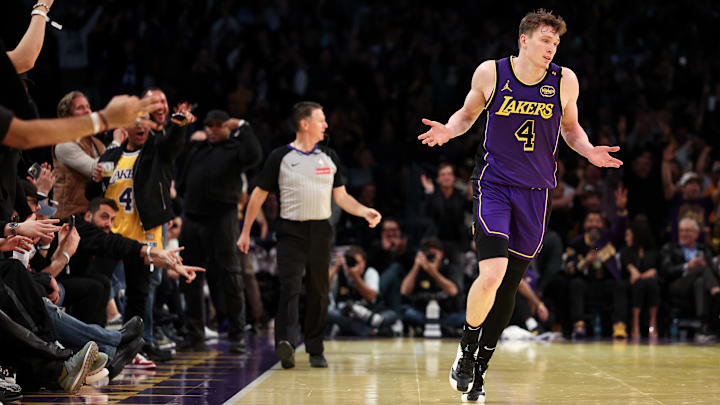If you follow the NBA Draft in any manner whatsoever, you've likely heard some variation of it: "This player is talented, and should probably thrive at the next level, but they're too old to select." Los Angeles Lakers sharpshooter Dalton Knecht is more familiar with the notion than most.
Despite winning the SEC Player of the Year award, leading the Tennessee Volunteers to the Elite Eight, and having prototypical size, athleticism, and shooting ability, Knecht fell to No. 17 overall at the 2024 NBA Draft.
It's one of the most baffling developments in recent NBA Draft history, especially at a time when most argued that it was a weak class of incoming rookies. The fact that he was a 23-year-old entering the Association, however, scared half the league off—a truth that worked out wonderfully for the Lakers.
Through 15 NBA games, Knecht is averaging 11.7 points in just 22.7 minutes per game, shooting the lights out at a clip of .520/.461/.923.
Knecht's rise in prominence reached another level when he dropped 27 points on the New Orleans Pelicans and followed up with 37 against the Utah Jazz. It was all a part of a recent stretch during which he's scored at least 14 points in five consecutive games.
More importantly, it was yet another example of how narrow-minded the evaluation process has become at the NBA Draft.
Upside matters, but scouts are blatantly ignoring obvious talent
Knecht is anything but an unexpected success story. He was a consensus first-team All-American in 2023-24, earning a slew of accolades and dropping 37 points against Zach Edey and the Purdue Boilermakers in the Elite Eight of the 2024 NCAA Tournament.
Standing at 6'5" and 215 pounds with a 6'9.25" wingspan, an elite jump shot, a 39.0" vertical, and top-tier marks in every drill at the Combine, Knecht had everything scouts look for.
Unfortunately, being 23 somehow meant that Knecht wasn't worth investing a draft pick in. Players who have accomplished a fraction of what he has, let alone refined their skill sets to the point he has, have been prioritized based on the mere hope that they could become significantly better than they've thus far appeared to be.
That approach can yield great results, but the idea that a player's age and collegiate experience limit their value is as bizarre as it is untrue.
Recent All-NBA honorees Jalen Brunson, Jimmy Butler, Draymond Green, Damian Lillard, and Pascal Siakam all made their NBA debuts at 22—just one year younger than Knecht. The same can be said for respected veterans such as Mikal Bridges, CJ McCollum, and Norman Powell.
For that matter, Malcolm Brogdon was drafted less than six months shy of turning 24—and no rational general manager would decline the value that any of those players have provided.
Unfortunately, the narrative that players in their early 20s are too old to value as one of the best players in the NBA Draft persists. Perhaps Knecht will begin to change scouts' outlook, but years of exceptions to a nonexistent rule have implied otherwise.
Top-tier talent is top-tier talent no matter how many seasons they've played in college—no matter how optimistic some may be that they can turn marble into David.
